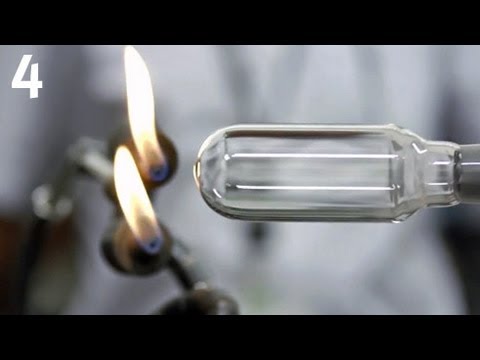The Royal Institution
UCL Chemist Andrea Sella picks two elements that combine to form the compound didymium. This material is used by glassblowers in the lenses of their safety glasses because it absorbs the light from the sodium flares given off by hot glass.
The Ri is on Twitter: http://twitter.com/ri_science
and Facebook: http://www.facebook.com/royalinstitution
and Tumblr: http://ri-science.tumblr.com/
Our editorial policy: http://www.rigb.org/home/editorial-policy
Subscribe for the latest science videos: http://bit.ly/RiNewsletter
Source




Awesome!
I think that he's allowed a little 'cheat' on this one. A marvellous discovery and an elegant application.
Can anyone tell me if the Royal Institute's Christmas lectures are being streamed online in some way? I live in Ireland and I don't have any United Kingdom Channels on my tv but I really want to see the lectures.
Thanks
Thanks a million, its much appreciated. =)
Science is awesome!
this one was cool!
SO COOL!
Masterful combination of science, video and music!
How badass is the guy in the back?!?!?!?
3:01
My fav element is Cu because in Portuguese it means ASS.
what brand of safety glasses are those?
This guy summarises nicely that UCL chemistry sucks
now that is amazing. What i always wonder is who came across this discovery, and how did they get their hands on the 2 different elements and how did they ever think to combine them into a pair of glasses etc etc gotta love living at a time where so many of these cool discoverys have all ready been discovered
My favorite element is Americium 241…Saving lives.
Imagine wearing these glasses at night – it would block all the artificial sodium lights.
Hey this guy was on periodic videos, I thought he liked mercury O__O
Too bad he didn't mention the bigger picture: every (practical) chemist is dependent on his glassblowers. Not just because it's often cheaper to repair glassware than to buy it anew but also because sometimes you need an apparatus which can only be custom made.
We had an apparatus for anionic polymerization that spanned two conjoined fumehoods.
Thanks glassmen!
I'd love to see what those glasses are like under sodium street lamps…
That guy kind of sounds like Nicolas Cage….
So if I wore those glasses out in the street at night (where the streets are illuminated by SON lights), would they behave in the same way? i.e. darkness?
Is there an application for this type of filter for astronomers that complain about light pollution?
I dont want to sound stupid but what if you looked at the sun with these?
Super cool.
Thank you for the information on didymium. I am going to buy some before I use my gas forge.
I Really liked this video! What inspires you to do this
One of my favorite things in science is the optical distortions and revelations possible. Since the day I removed the filter from my calculator so I could use it in high school in 1989 so the teacher wouldn't know I had it turned on to things like this video I have always been blown away by stuff like this. Also removing the filter from an LCD monitor so you can surf the web privately anywhere unless someone has on a pair of polarized lenses LOL
So the didymium glass works in a similar way to a solar filter by taking away the bright glare. Only difference is that solar filters are used in observing the sun safely while these glasses are used in reducing the glare caused by the sodium atoms in the glass so the glassblower can see what he or she is doing.
someone should adapt firefighters air masks with didymium or even their eyeshields that are mounted to their helmets {bourkes}
That's why I'm thinking using that glass with bourkes. Something you could flip down and not have them constantly "on" like they would be with a mask. Or if on a mask a switch to activate them like an auto dimming welders helmet.
I wonder how this was discovered. Must have taken a lot of trials to find something suitable.
Wait a sec is this the mercury bell guy?
Andrea Sella really does need to do a documentary series on the telly…
Mind you, cobalt glasses were also used for the same purpose (as well as for brazing metals)
Maybe didymium can be used by photographers in heavy light polluted areas like cities if they want to take pictures of the night skies?
sir i am glass blower plz contect me
Neodymium is also used for lasers. Nd doped glass is used for 1064nm infrared laser (and also green 532nm laser).
My favorite part of a glass demonstration is handing viewers a set of Didymium Glasses. The reaction is always worth it.